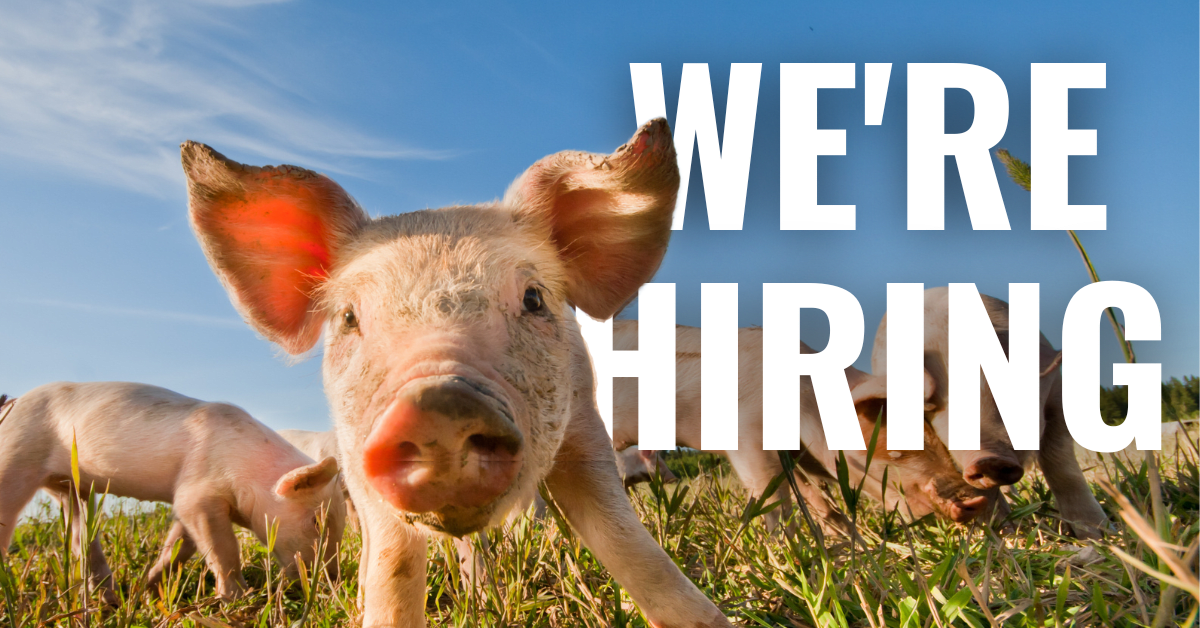About us
Compassion in World Farming is the leading international farm animal welfare charity, campaigning to improve the lives of millions of farm animals through advocacy, lobbying for legislative change and positive engagement with the global food industry. Our work is based on scientific evidence and best practice and as such we are recognised as the credible partner on farm animal welfare to the major food retailers, food service companies and manufacturers. Compassion’s established international Food Business programme aims to drive transformational change for animal welfare enabled by a reduction in the reliance on animal sourced foods and a shift towards regenerative farming.
We are now seeking an experienced regenerative farming expert to join our Food Business team.
Learn more or APPLY HERE
- Salary: £37,500 -£43,500 (Depending on experience)
- Job Type: Full-time - 3-year fixed term contract
- Working Pattern: Hybrid working pattern - 2 days in the office
- Location: UK Godalming, Surrey
About the role
The Regenerative Farming Manager is a new and exciting solutions-based role at CIWF! The core purpose is to inspire, inform and persuade Corporates in the UK to shift towards more regenerative farming practices as part of our mission to end factory farming. Responsibilities include building a strong network within the regenerative farming community and other relevant organisations; developing tools and resources to help build the business case for change. The candidate will be the Food Business expert on regenerative farming practices and principles within Compassion’s Food Business programme. The role will involve working closely with companies to secure meaningful commitments towards regenerative farming within their sustainability and corporate social responsibility (CSR) frameworks.
Additionally, the Regenerative Farming Manager will play a pivotal role in recognising progress within the industry by managing initiatives, such as the Sustainable Food and Farming Award process, which rewards and promotes companies making strides in regenerative practices. As part of this role the candidate will also represent Compassion in World Farming at industry forums, roundtables, and coalitions, advocating for regenerative farming practices and ensuring our mission is communicated effectively.
If you are passionate about regenerative farming, animal welfare, and making a tangible impact within the food industry, we encourage you to apply for this rewarding and impactful role.
About you
To succeed in this exciting new role, you’ll need a strong foundation in regenerative farming practices, ideally with hands-on experience in implementing these principles, within livestock farming contexts. You’ll excel in developing persuasive business cases and have a strong ability to build strategic partnerships. Strong project management skills will be essential for effectively planning and executing initiatives that will help to drive meaningful change. Additionally, excellent communication and interpersonal skills are key to engaging with diverse stakeholders and navigating complex issues in the pursuit of a future fit food system.
You’ll need be deeply passionate about food ethics, driven by a genuine desire to make a positive impact on People, Planet and Animals . You’ll need to work collaboratively, within cross-functional teams, leveraging collective expertise to achieve shared objectives. Strong problem-solving abilities and adaptability are crucial traits, enabling you to navigate challenges and contribute innovative solutions to promote regenerative farming practices. Please note that due to the nature of this role, and duties regarding traveling, you will need to have a clean licence and have access to a vehicle.
To apply - LINK
Closing date: 12pm 21st June 2024
Please complete the online application form and upload your CV and covering letter outlining how you meet the person specification detailed in the Job Description.
Please note that we reserve the right to commence interviews on a rolling programme. To comply with legal requirements, as part of our selection procedure, we ask all potential employees to prove their eligibility to work in the UK. No agencies please.
Compassion in World Farming is absolutely committed to providing equal opportunities for everyone regardless of their background. We value diversity and live experience and acknowledge the underrepresentation of people from certain backgrounds, both within our organisation and across the sector. We welcome applications from underrepresented groups, whether these be of ethnicity, gender, identity, religion, physical ability, sexual orientation or other.



